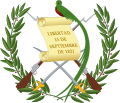You can help expand this article with text translated from the corresponding article in Spanish. (January 2018)Click [show] for important translation instructions.
|
| Supreme Court of Justice of Guatemala | |
|---|---|
| Corte Suprema de Justicia de Guatemala | |
 | |
 Palace of Justice, the seat of the Supreme Court of Justice | |
 | |
| 14°37′37.1077″N90°30′47.6303″W / 14.626974361°N 90.513230639°W | |
| Established | October 11, 1825 |
| Jurisdiction | Guatemala |
| Coordinates | 14°37′37.1077″N90°30′47.6303″W / 14.626974361°N 90.513230639°W |
| Number of positions | 13 |
| Language | Spanish |
| Website | www.oj.gob.gt |
| President of the Supreme Court of Justice | |
| Currently | Oscar Cruz Oliva |
| Since | 21 November 2023 |
| This article is part of a series on |
| Politics of Guatemala |
|---|
 |
The Supreme Court of Justice of Guatemala (La Corte Suprema de Justicia), or CSJ, is the highest court within Guatemala's judiciary branch. As the highest Court in Guatemala, it has jurisdiction over all legal matters that may arise in the country. The Court sits in the Palace of Justice, in Zone 1 of Guatemala City. The current president of the Supreme Court of Justice is Oscar Cruz Oliva, who was voted in by the Congress of the Republic of Guatemala. [1] [2]
The Supreme Court of Justice was established by the Constitution of Guatemala (articles 203-222) and also operates under the legal framework set out in the Law of the Judicial Branch, Decree Number 2-89 of the Congress of the Republic of Guatemala and the General Regulation of the Courts, Agreement Number 36-2004. The Supreme Court is composed of thirteen justices, including its president. [3]